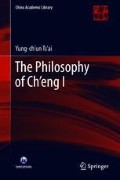Abstract
Man has always enjoyed a central position in the Confucian system. Confucius (551–479 B.C.) made the achievement of perfect manhood the very core of his teaching. Mencius (372?–289? B.C.) by the doctrine of the goodness of human nature raised him to a glorious height.
Access this chapter
Tax calculation will be finalised at checkout
Purchases are for personal use only
Notes
- 1.
YK, App. III, II, X, 63; App. V, II, 4.
- 2.
Mencius, VI, I, VI–VIII, esp. VIII, 2.
- 3.
Ta Yu is the name of Hex. 14, and means Great Havings.
- 4.
Shu King, II, III, 2. “The work is Heaven’s; men must act for it”.
- 5.
YK, App. II, Hex. 11.
- 6.
In the original text, this passage was abridged. Here for the convenience of the reader, it is given in full.—Doctrine of the Mean, XXII.
- 7.
The reference for this expression is not yet found.
- 8.
Shu King, II, III, 3.
- 9.
Mencius, II, I, VI, 5. For explanation, see the introductory part of the present chapter.
- 10.
Mencius, VI, I, VIII, 2.
- 11.
Ibid., VI, I, VI, 5. The word ch’ing here is more rightly rendered “nature” than “feeling”.
- 12.
This is a saying by Confucius.—Analects, I, II, 2.
- 13.
Mencius, VI, I, VI, 7.
- 14.
Mencius, II, I, VI, 5.
- 15.
The five constant virtues consist of Jen or benevolence, righteousness, propriety, wisdom and good faith.
- 16.
Doctirne of the Mean, I.
- 17.
Mencius, VII, I, XXXVIII.
- 18.
That of benevolence, righteousness, propriety and wisdom. See Mencius, II, I, VI, 5.
- 19.
The word ts’ai has the double connotation of talent and material. Here it is used in the latter sense. Legge’s rendering into “power” is, it seems to me, the nearest word we could get.—See Mencius, VI, I, VIII, 2. Ref. IS, XVIII, 19b: 9.
- 20.
Mencius, VII, II, XXX.
- 21.
Ibid.
- 22.
Analects, XVII, II.
- 23.
Mencius, III, I, I, 2.
- 24.
Mencius, VI, I, III, 1.
- 25.
Analects, XVII, III.
- 26.
Mencius, IV, I, X, 1.
- 27.
See Footnote 25.
- 28.
See Footnote 26.
- 29.
YK, Hex. 49, text of the sixth divided line, on which Ch’eng I is here commenting.
- 30.
*ICWC, VII, 6a: 11f.
- 31.
Chu Hsi, Chu Tzu Yü Lei, Bk. 126. Ref. also Chia T’ai P’u Teng Lu, as quoted in Yang Tung-chuan, Chung Kuo Hsüch Shu Shih Chiang Hua, p. 257.
- 32.
Yeh Shih, Hsi Hsüeh Chi Yen, as quoted in Chung T’ai, Chung Kuo Che Hsüeh Shih, pp. 24–26.
- 33.
Chang Ping-lin, Chang Shih Ts’ung Shu: Chien Lun, Bk. 4, “T’ung Ch’eng”, pp. 3b–8a.
- 34.
Chung T’ai, loc. cit.; Ch’ien Mu, Kuo Hsüeh Kai Lun, Part II, p.33; Watanabe, A brief Introduction to the History of Chinese Philosophy, Chinese ed., p.31.
- 35.
Fung, A Short History of Chinese Philosophy, p. 254.
- 36.
- 37.
IS, II A, 2a: 11; 3a: 13.
- 38.
Sect. 2.3.1.1.
- 39.
Doctrine of the Mean, Chap. I: 1, 4.
- 40.
Lin Yutang, Ed., The Wisdom of India and China, p. 845.
- 41.
Son of Lü Ta-chün (1033–1082), another source says that this is the style of appelation of Lü I-shan. See original note in the text, *ICWC, V, 10b: 4.
- 42.
Mencius, I, I, VII, 13.
- 43.
Mencius, IV, II, 12.
- 44.
Shu King, II, 2, 2, p. 50.
- 45.
Doctrine of the Mean, I.
- 46.
“The great man is he who does not lose his child’s heart”, Mencius, loc. cit.
- 47.
Shu King, II, II, 2.
- 48.
“There were four things that the Master wholly eschewed: he took nothing for granted, he was never over-positive, never obstinate, never egoistic.”—Analects IX, 4. Arthur Waley’s tr.
- 49.
Mencius, I, I, VII, 13, quoted above.
- 50.
Appendix II, I, X, 62.
- 51.
Here the writer is referring to Mencius, VI, I, VII, 8, where in discussing the goodness of human nature he said, “Therefore I say, ‘Men’s mouths agree in having the same relishes, their ears agree in enjoying the same sounds; their eyes agree in recognizing the same beauty: shall their minds alone be without that which they similarly approve? What is it then of which they similarly approve? It is, I say, the principles of our nature, and the determinations of righteousness. The sages only apprehended before me that of which my mind approves along with other men. Therefore the principles of our nature and the determinations of righteousness are agreeable to my mind; just as the flesh of grass and grain-fed animals is agreeable to my mouth.”
- 52.
Doctrine of the Mean, XX, 18.
- 53.
Mencius, VI, I, VIII, 5.
- 54.
YK, App. I, Hex. XXIV, 5.
- 55.
Great Learing, Text: 1 and 2; Commentary: 3.
- 56.
Ibid.
- 57.
YK, App. I, Hex. 52: 2.
- 58.
Mencius, VII, I, IV, 1.
Author information
Authors and Affiliations
Corresponding author
Rights and permissions
Copyright information
© 2018 Foreign Language Teaching and Research Publishing Co., Ltd and Springer Nature Singapore Pte Ltd.
About this chapter
Cite this chapter
Ts’ai, Yc. (2018). His Idea of Man. In: The Philosophy of Ch’eng I. China Academic Library. Springer, Singapore. https://doi.org/10.1007/978-981-10-8566-6_5
Download citation
DOI: https://doi.org/10.1007/978-981-10-8566-6_5
Published:
Publisher Name: Springer, Singapore
Print ISBN: 978-981-10-8565-9
Online ISBN: 978-981-10-8566-6
eBook Packages: Religion and PhilosophyPhilosophy and Religion (R0)

